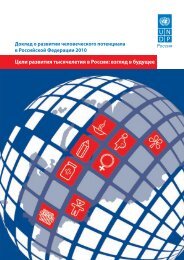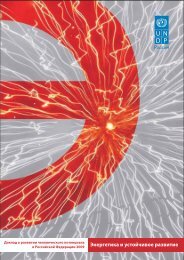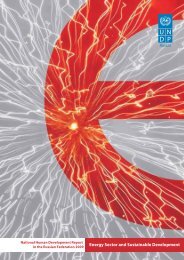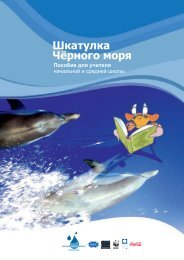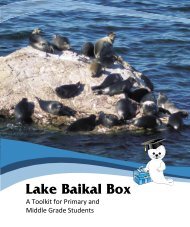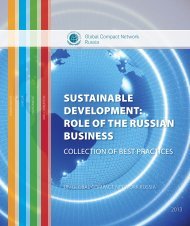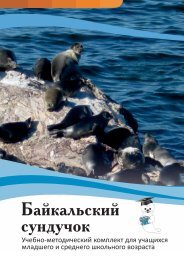Report - UNDP Russia
Report - UNDP Russia
Report - UNDP Russia
Create successful ePaper yourself
Turn your PDF publications into a flip-book with our unique Google optimized e-Paper software.
Box 1.1. Correlation between climate change, the energy sectorand human developmentClimate change is one of the most dramaticgeopolitical and economic problems of the century,since it poses a real threat to human development andbetter quality of life worldwide in both the short andlong term. Production and combustion of fossil fuelsare one of the main causes of registered increase inGHG emissions and resulting quickening of the globalclimate change process. In <strong>Russia</strong> over 72% of GHGemissions are related to use of fossil fuels.Climate monitoring records by thenational hydrometeorological network, as well asscientific publications by <strong>Russia</strong>n and foreignscientists on global climate change and itsconsequences show significant negative and, insome cases, positive impact from climate changeon <strong>Russia</strong>’s natural environment and socioeconomicdevelopment, both nationally and byregions. The Assessment <strong>Report</strong> on ClimateChange and its Impact on the <strong>Russia</strong>n Federation,prepared in 1998 by experts of the StateHydrometeorological Committee (Roshydromet),the <strong>Russia</strong>n Academy of Sciences and specialistsfrom the country’s universities 8 , did much to focusattention on severity of the problem.Climate change will have negative impacton many parts of the national economy and theenergy sector may be among the hardest hit.Energy facilities in Siberia and northern territoriesare particularly vulnerable due to thawing ofpermafrost, which covers two thirds of <strong>Russia</strong>’sterritory. It is expected that depth of seasonalmelting will increase by 30-50% by 2050, which willcreate new technical challenges for the resourceextraction industry in the <strong>Russia</strong>n Arctic and Siberia.Communities and energy infrastructure intraditional permafrost areas are particularly at risk.In Western Siberia 21% of all accidents on trunk oiland gas pipelines have mechanical causes,including failure of foundations and deformation ofsupports.Further melting of the permafrost coulddamage even larger facilities, such as oil depots.Special technical projects will be needed in orderto prevent an increase of oil and gas pipelinefractures.Forecast change of flow volumes in riverswill change the of water influx to large reservoirs.Forecasts predict a 5-10% increase of water influxto the Volga-Kama reservoir series and toreservoirs in the North-Western Federal District.Water influx to reservoirs on the Angara andYenisei rivers, and also on the Viluy, Kolyma, andZeya rivers will increase by between 0% and 15%.Changes in river flow due to expected climatechanges will force reassessment of reservoiroperation procedures with respect to main users(especially power generating facilities) and theenvironment.<strong>Russia</strong>’s transportation infrastructure isalso at risk. Increasing volume and frequency ofprecipitation, and the fact that winterprecipitation will increasingly be in the form ofrain, rather than snow, will tend to destabilize roadbeds and weaken support walls. Prolonged dryperiods could result in soil subsidence beneathstructures and buildings. Larger temperaturefluctuations will speed up road degradation.Permafrost melt is already destroying winter iceroads, which are vitally important for the oil andforestry segments.<strong>Russia</strong> is more subject to weather extremesthan other countries of Europe and Central Asia andvulnerability of the country’s economy reflects itslarge tracts of territory with unfavorable ecologicalconditions and poor condition of the country’sinfrastructure.Benefits from climate changes in <strong>Russia</strong>include reduction of heating costs, greater potentialfor agriculture and forestry, ability to developshipping along the Northern Sea Route, as well asgreater access to, and hence production of, mineralresources and biological marine resources.Both positive and negative climate changeimpacts require complex and professional study. Itis important to develop climate risk assessment andforecasting research, as well as studies of theirpossible benefits for the energy industry and othersegments so that these factors can be taken intoaccount when making long- and medium-termstrategic decisions.8Assessment <strong>Report</strong> on Climate Change and its Impact on the <strong>Russia</strong>n Federation: General Summary, Roshydromet, 200826National Human Development <strong>Report</strong> in the <strong>Russia</strong>n Federation 2009



